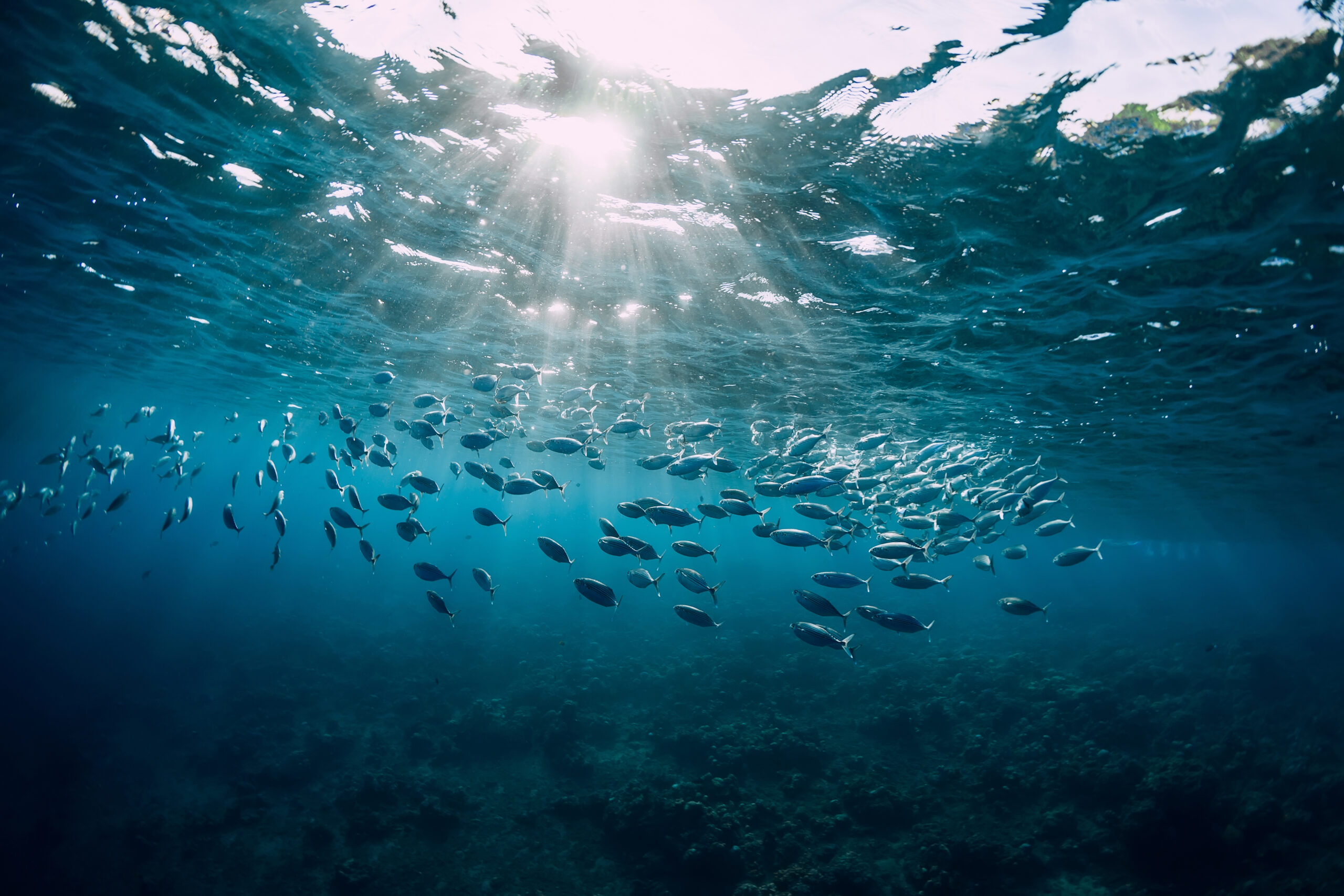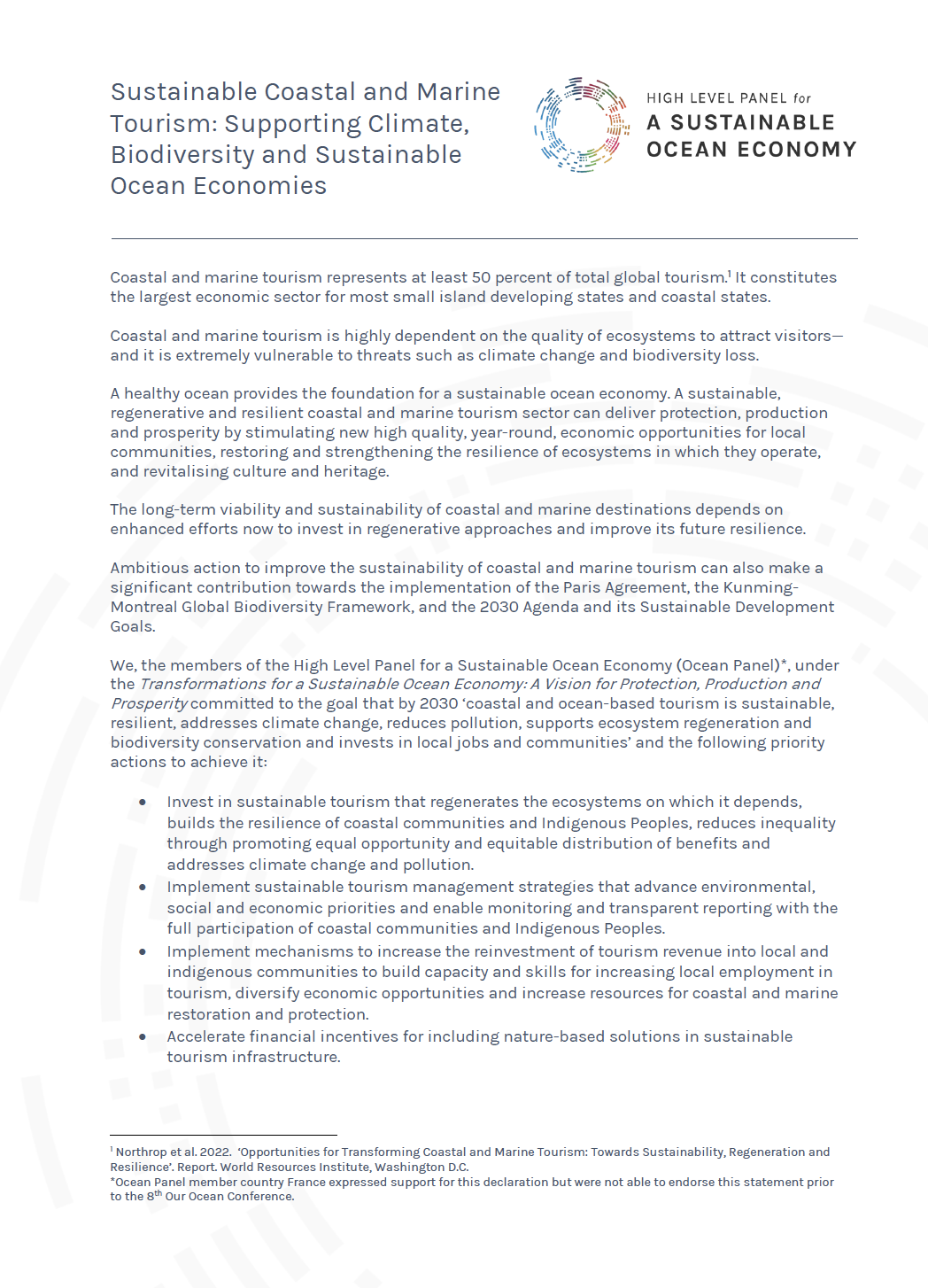沿海和海洋旅游至少占全球旅游总量的 50%。1 它构成了大多数小岛屿发展中国家和沿海国家最大的经济部门。
沿海和海洋旅游业高度依赖生态系统的质量来吸引游客,而且极易受到气候变化和生物多样性丧失等威胁的影响。
健康的海洋为可持续的海洋经济奠定了基础。一个可持续、可再生和有弹性的沿海和海洋旅游部门可以通过为当地社区刺激新的高质量、全年的经济机会、恢复和加强其经营所在的生态系统的弹性、振兴文化和遗产。
沿海和海洋目的地的长期生存能力和可持续性取决于现在加大力度投资再生方法并提高其未来的恢复力。
提高沿海和海洋旅游业可持续性的雄心勃勃的行动也可以为实施《巴黎协定》、《昆明-蒙特利尔全球生物多样性框架》以及《2030 年议程》及其可持续发展目标做出重大贡献。
我们,可持续海洋经济高级别小组(海洋小组)*的成员,根据 可持续海洋经济的转型:保护、生产和繁荣的愿景 致力于实现到 2030 年“沿海和海洋旅游业可持续、有弹性、应对气候变化、减少污染、支持生态系统再生和生物多样性保护并投资于当地就业和社区”的目标,并采取以下优先行动来实现这一目标:
- 投资于可持续旅游业,以再生其所依赖的生态系统,增强沿海社区和土著人民的复原力,通过促进平等机会和公平分配利益来减少不平等,并解决气候变化和污染问题。
- 实施可持续旅游管理战略,推进环境、社会和经济优先事项,并在沿海社区和土著人民的充分参与下实现监测和透明报告。
- 实施增加旅游收入对当地和土著社区的再投资的机制,以建设能力和技能,以增加当地旅游业的就业,使经济机会多样化,并增加沿海和海洋恢复和保护的资源。
- 加快财政激励措施,将基于自然的解决方案纳入可持续旅游基础设施。
- 投资于沿海和海洋旅游的污水处理和废水基础设施,以改善沿海社区的健康并减少对沿海和海洋生态系统的影响。
为了支持加快这些优先行动的进展,小组委托了一份关于海洋旅游的专家报告, 改变沿海和海洋旅游业的机会:迈向可持续性、再生和复原力.作为海洋小组的成员,我们呼吁各国政府以及海洋和沿海旅游部门的利益相关者促进:
- 加强合作与协作.旅游部门的每个人都可以发挥作用,包括支持真正的伙伴关系,为当地社区的领导提供机会。
- 餐桌旁的一个座位.确保将旅游业纳入海洋、气候和生物多样性议程以及相关国际平台。
- 气候变化行动.加快努力减少整个旅游业的排放,并与《巴黎协定》的温度目标保持一致,并保持在 1.5 以内oC 限制温度上升,包括通过与国家和相关非国家行为者和倡议的合作,例如《关于旅游业气候行动的格拉斯哥宣言》。
- 有益于自然的旅游.利用基于自然的解决方案来提高沿海和海洋旅游的恢复力,并确保与昆明-蒙特利尔全球生物多样性框架保持一致。
- 投资支持转型.为了为旅游业的积极转型提供资金,需要修改现有的金融和激励结构,许多目的地将需要新的创新和可持续的金融机制,包括混合融资。
| 安东尼·艾博年
澳大利亚总理
|
威廉·萨莫伊·鲁托
肯尼亚总统 |
| 贾斯汀·特鲁多
加拿大总理
|
安德烈斯·曼努埃尔·洛佩斯·奥夫拉多尔
墨西哥总统 |
| 加布里埃尔·鲍里克
智利总统
|
哈格·根哥布 纳米比亚总统 |
| 西提尼拉布卡
斐济总理
|
乔纳斯·加尔·斯托尔
挪威首相 |
| Nana Addo Dankwa Akufo-Addo
加纳总统
|
Surangel Whipps, Jr.
帕劳总统 |
| 佐科维多多
印度尼西亚总统
|
安东尼奥·科斯塔
葡萄牙总理 |
| 安德鲁·迈克尔·霍尔尼斯
牙买加总理
|
里士苏纳克
英国首相 |
| 岸田文雄
日本首相
|
小约瑟夫·R·拜登
美利坚合众国总统 |


 以前的
以前的



